|
|
This page was last modified 2024-01-21
| |||||||||||||||||||||||||||||||||||||||||||
Martlesham - some thoughts on the nameAddendum 2012-10-29: this extract from page 528 of Gysseling's Toponymisch Woordenboek van België, Nederland, Luxemburg, Noord-Frankrijk en West-Duitsland (vóór 1226)(1960) shows that the German place-name Hüthum has the same meaning as that I propose for Martlesham.
Addendum 2012-08-17: the OE word mær(e)ls (probably with a long vowel) is now more firmly established, as we have the new edition of the Antwerp-London glossaries instead of the corrupt Junius and Wright-Wülcker editions (D. W. Porter (ed.) The Antwerp-London glossaries: the Latin and Latin-Old English vocabularies from Antwerp, Museum Plantin-Moretus 16.2 — London, British Library Add. 32246, Toronto 2011). This has (at line 2703): pronesium . mærels rap . ł . Tonsilla scipmærls. Therefore mær(e)ls must mean ‘mooring post’, since that is what tonsilla means (pronesium is a mooring-rope). See also heath - some thoughts on the word. Note: I have published a version of this material in Journal of the English Place-name Society, 38, 31-36 (2006). You may download a pdf of this article here. The confusionThe origin of the name of Martlesham, Suffolk has never been clear. The earliest recorded form is Merlesham in the Domesday book (1086), a spelling which survives to the 16th century. An issue here is whether the omission of the -t- is significant. Some recorded spellings are:
The standard reference works do not agree on the meaning:
The 'marten' theory is weakened by its inability to explain the persistent medial -l-. At least nobody disputes that the -s- is genitival in origin, so that the historical pronunciation would be Mar(t)ls-ham. The modern pronunciation as Martle-sham is unetymological. It is generally assumed that the suffix is ham 'farm' or 'settlement', but given the situation of Martlesham on a creek, hamm 'meadow' surely cannot be ruled out. Other people have tried to relate the name to 'marl', from the type of soil in the district. But it is not clear that the soil really is marly. A new theoryHere is my new theory for Martlesham: it is derived from the Old English word mærels 'mooring-rope'. (The æ is a long vowel, like the vowel in RP 'air' or French père; the s is of course pronounced unvoiced as s, not as z.) This fits the earliest forms well, and suits the topography perfectly - there is even today a meadow next to a mooring place at the head of Martlesham creek, just below the church (TM 261 470). The same idea would suit Marlesford. This theory seems to me much the best - the phonological fit is perfect, it accords with the most likely place for the nucleus of the village and the reason for its establishment, and it involves no conjectural names. There is a close parallel with the name Windsor, OE *windels-ora which means 'windlass bank'. In both cases a spot on a river-bank has been named from a mooring device which would have been important to the original inhabitants. Note also Windlesham, OE *windels-ham(m?). Note further that the Old English words for 'windlass' (*windels) and 'mooring-rope' (mærels) have the same -els suffix. This suggests that they may have been used in contrasting fashion, so that, for example, Windsor means 'the river bank where there is a winding device to pull you out of the water', and the names in Marles- mean 'the river bank where you have to use your own rope', or perhaps 'the river bank where there is a fixed rope to tie to'. Now all we need is to discover a name Marlsor! If this theory is correct, the -s- is not genitival. Note that the Old English word has surviving relatives in nautical terms such as marline, marlinespike and possibly the fish marlin (see the OED on this). 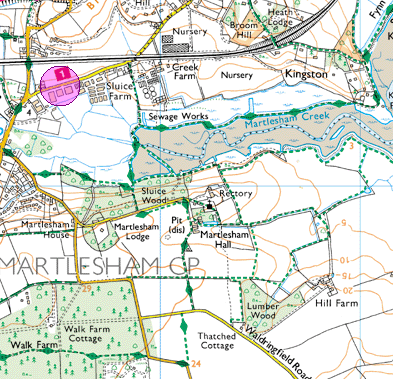
Image produced from the Ordnance Survey Get-a-map service. Image reproduced with kind permission of Ordnance Survey and Ordnance Survey of Northern Ireland.
So why is there a -t-?A tricky one. Linguists would just say it's is inorganic, intrusive or parasitic, but this doesn't really explain it at all. I do not have another place-name example of exactly this type. There are examples of so-called excrescent -t in standard English, such as against, amongst, and whilst. Parasitic -d also occurs, such as weld from well (this might come from the past tense); and intrusive -d-, such as alder from Old English alor. (Other examples worth thinking about: paddock parroc=park; the French a-t-il? type.) Note also that Mersea (Essex) is recorded once as Martsey in 1267 (Ess:320). Another relevant example is Pardlestone ST 144 421, which was Perlestone DB. But the phonetic environment in Marlesham is different. In Wild's A history of modern colloquial English, we find on page 309 an example from 1573 of maltconceived for malconceived. But as a hapax, this might just be a spelling error. I think we have to look to sociological factors such as class speech varieties. If a person with pretensions to higher social class heard, for example, a working-class person pronounce Martin as Marr'n, and did not want to be associated with such pronunciations, he might incorrectly alter Marls-h'm to Martls-h'm. In this view, the -t- is a kind of hypercorrection. The name Martel is recorded in Norfolk and Essex in the 11C and 13C, so no doubt existed in Suffolk too. Martlesham has perhaps been assimilated to this name. Note also the name Marlbrook (Shropshire), from the Old English words mære and broc (long o), so that the name means 'boundary brook', and the -l- is intrusive. An interesting early reference to a man from Martlesham is in the Calendar of letter-books of the city of London for 1352-1374: folio ccciv is an indenture witnessing the delivery of a fully equipped barge called "the Paul of London" to William Martlesham, mariner, master of the same, for the King's service. Dated 29 July, 47 Edward III. [A.D. 1373]. In folio cccvi, has name has changed slightly: Thereupon the sum of 20 marks was delivered to William "Martesham," the master of the barge, for buying anchors, cables, and other necessaries. Folio cccvii has Be it remembered that William Martesham, master of the ship called "the Paul of London," on the 24th Sept., the year aforesaid, gave the Mayor and Aldermen to understand that two anchors and two cables belonging to the aforesaid barge were lost during its last voyage. Whereupon John de Caunte brigge, the Chamberlain of the Guildhall, delivered to the said William on behalf of the City the said day 20 marks wherewith to buy anchors, cables, and other necessaries for the barge, and the said Chamberlain holds an acquittance for the same. , where we also see an early form of the name of Cambridge. Obsolete theories - of historical interest onlyThe following two articles are scanned from the East Anglian Miscellany, 1951. Note these deficiencies:
Photograph of Martlesham creek
TM 261 470 - the possible site of the mærels and hamm at Martlesham. Marlesford - addendum 2008 May 12The topography at Marlesford (TM 322 581) seems perfect for this interpretation. At the ford, which is on a narrow sunken lane which forms the main street of the village, a basin has been made on the downstream side (see photo below, taken 2008 May 10 - the basin is under the footbridge). It is in effect a miniature dock, thus connecting Marlesford via the River Ore to the River Alde (at Beversham). Probably the road was part of a main route in East Suffolk, before it was bypassed by the turnpike which is now the A12, with a new river crossing at TM 325 576. Also, the old railway branch to Framlingham passes right by this spot; that railway was for moving out agricultural products, which suggests that the Marlesford dock previously had the same function. Of course, we cannot know if it is of Anglo-Saxon date, but it seems to me very plausible that Marlesford is the `mooring-place ford'. The situation (the highest navigable point on a stream) is similar to Martlesham, but on a much smaller scale.
|

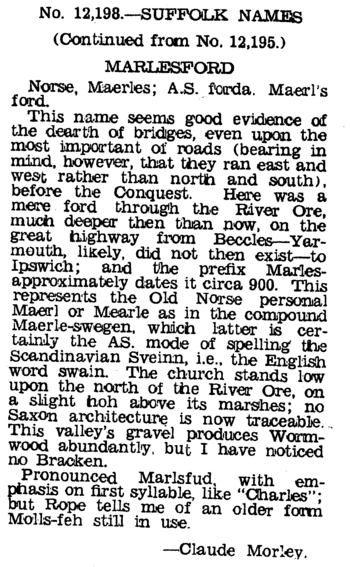
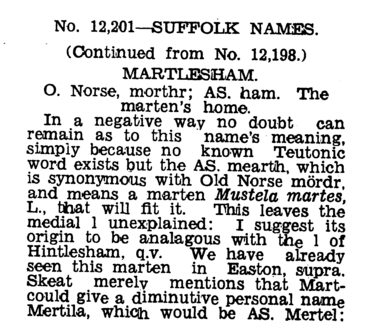
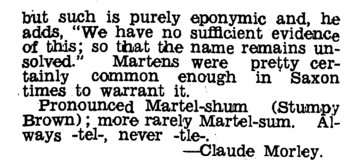

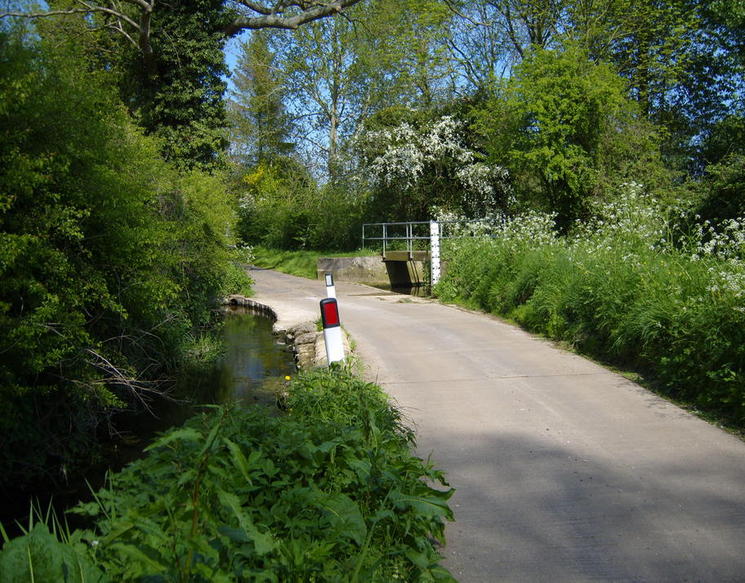 This website uses no cookies. This page was last modified 2024-01-21 10:57
by
This website uses no cookies. This page was last modified 2024-01-21 10:57
by